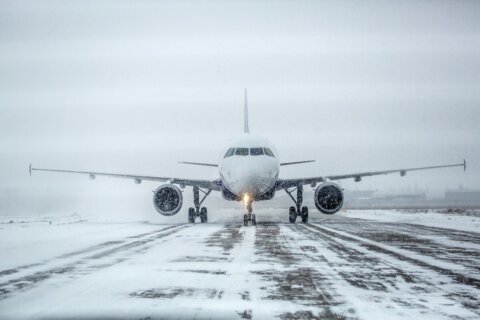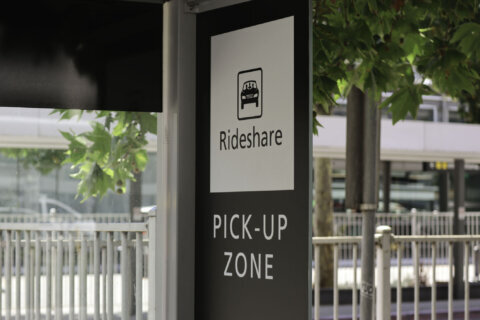As any seasoned traveler can attest, nothing spoils a trip faster than a hurricane or severe snowstorm that disrupts or cancels a flight. But while you can’t control when bad weather will wreak havoc on your plans, there are simple steps you can take to avoid spending extra hours waiting in a cramped terminal or tarmac and dodge stress-inducing moments getting rebooked. Use these pro hacks to stay calm and get your plans back on track when inclement weather strikes.
[See: 10 Frequent Flier Secrets Every Traveler Should Know.]
Stay Prepared
Before you head to the airport, pack strategically and arrive ready for anything that might come your way. If you’re planning to check a bag, keep a few essentials (electronics, medications, toiletries and a change of clothes) in your carry-on in case something goes awry and you get separated from your luggage, advises Robert Firpo-Cappiello, editor in chief of BudgetTravel.com.
Though there’s no foolproof, time-tested trick to dodge weather-related delays, it’s also a smart idea to monitor conditions well in advance of your trip, so you can pivot quickly if necessary, says Gabe Saglie, senior editor at Travelzoo. “The first thing to do after any hint of bad weather is to get in touch with your airline. Some airlines will pre-emptively waive change fees ahead of major storms. If your schedule is flexible, take advantage and change your plans before the figurative flood of requests comes in,” he says.
If your schedule allows, also make sure to book an earlier nonstop flight, “as they are less likely to be affected by the ripple effects of delayed or canceled flights as conditions worsen,” Saglie adds. And before you book your hotel, stay attuned to potential restrictions, such as a cancellation window and if the hotel policy allows you to postpone your trip due to inclement weather conditions, he says.
Don’t Connect Through Storm-Prone Hubs
It may sound like a no-brainer, but if you’re able to avoid traveling through airports that are commonly impacted by disruptions and cancellations, you’ll decrease your odds of getting stalled in transit. “Chicago in January or Miami during hurricane season comes to mind,” Saglie says. If there’s an alternative connection at the time and price you want, that may be “the safer choice,” he adds. “If not, make sure to plan enough time between flights to allow for a slight delay.”
Christopher Elliott, a consumer advocate and journalist, suggests skipping popular hubs in New York, Atlanta, Chicago and Dallas to avoid crowds, potential delays and the risk of losing your luggage when you switch planes.
Be in the Know
Download your airline’s app ahead of your trip and monitor your flights to stay aware of potential delays, Firpo-Cappiello says. “If you download the app of the airline you are flying, you can really feel like you are taking charge and [are] not at the mercy of the weather and airport personnel,” he adds. Aside from airline apps, you should also stay informed by visiting the websites for the airlines you’re departing from and connecting through, or use free savvy trip-monitoring tools such as FlightAware.com and TripIt for up-to-the-minute flight changes and alerts.
[Read: 7 Sanity Savers to Survive Thanksgiving Travel.]
Understand Your Rights
Whether you’re entitled to reimbursement depends on the cause of your delay. “If you’re stuck in the airport, the first question you have to ask is ‘Why?'” Elliott says. If it’s a weather delay, you don’t have any rights per se, but you should politely reach out to a desk agent and inquire about a voucher or hotel room, Elliott says. In this scenario, you should also call your travel agent immediately to get rebooked, Elliott cautions. Though your carfrier is not required to pay for your flight or your lodging in the event of a weather delay, “if you remain calm, talk to customer service reps politely and acknowledge that you understand how stressful their situation is, they may offer vouchers,” Firpo-Cappiello says.
On the other hand, if your flight is canceled due to a mechanical delay, make sure to read your carrier’s “contract of carriage,” a document that outlines what passengers are entitled to in the event of a cancellation, Elliott says. In this scenario, typically your airline will refund your ticket or rebook you on the next available flight, but make sure to read the carrier’s individual policy.
And in the unlikely event you’re stalled on the tarmac, there are rules in place from the Department of Transportation that after three hours, passengers must be able to exit the aircraft. Plus, after two hours, fliers must be able to use the lavatory and have access to food and water, Elliott explains, so don’t be afraid to speak up.
Act Quickly to Get Rebooked
If you learn your flight is canceled while at the gate, stay in line. While waiting, call the airline customer service agent, which can often be faster and easier, Firpo-Cappiello explains. “The earlier you get in touch with someone, the sooner you can get your travel plans rebooked if necessary,” he adds. Conversely, “delayed flights are a waiting game,” he cautions. Make sure to linger near your gate to stay looped in on the latest developments. Stay proactive by looking for alternative flight option availability on sites like FlightStats.com, and use tools such as WorldMate or TripIt Pro to rebook instantly.
If All Fails, Seek Solace at the Airport Lounge
Lounge access typically costs around $50 for a day pass and comes stocked with coveted perks such as Wi-Fi access, complimentary beverages and snacks, not to mention a calmer atmosphere than frenzied terminals. So, if you’re stranded for several hours, it makes sense to regroup and utilize tools like GateGuru to scope out the closest restaurants, spa services and entertainment options near your gate.
[See: 9 Steps to Trim Holiday Travel Costs.]
Protect Your Trip With Insurance
Choosing the right insurance option depends on your itinerary and other factors such as price and length of your trip. “Considering travel insurance is always a smart idea … whether it will help you or not is an open question,” Elliott says. To receive trip cancellation and interruption benefits, such as reimbursement for costs that are nonrefundable (think: plane tickets), there must be a significant and unforeseen inclement weather interruption. Plus, there tend to be exclusions and caveats, so it’s important to do your homework, Elliott explains. Before you invest in insurance, rely on a reputable comparison site such as InsureMyTrip and Squaremouth.com to help weigh your options.
More from U.S. News
7 Free Apps to Make Travel Easier
10 Hacks for Headache-Free Travel This Holiday Season
9 Last-Minute Places to Escape the Holidays for Less Than $1,000
How to Handle Weather-Related Delays and Cancellations Over the Holidays originally appeared on usnews.com







